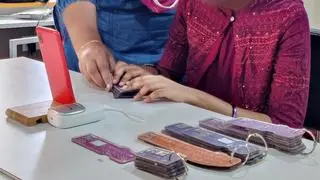Three years back, when this column profiled Daniel Raj David and the venture he co-founded, Detect Technologies, the company’s two main products — GUMPS and Noctua — had just done pilots and had not yet been commercially sold. Now, both the products have proved successful in the market, finding application mainly in the oil and gas industry.
As we meet up at Detect’s office at the IITM Research Park, Daniel says he is in the process of relocating to the US, by far the largest and most technologically advanced market in the oil and gas sector, marking Detect’s next stage of growth. The company’s products are undergoing paid pilots in the US, as Detect hopes to crack the international market.
Daniel explains that the company thought long and hard about its next stage of growth, after having tested out the products in India through field trials at oil companies such as IOC, BPCL, HPCL and Reliance, and those in the process sector, such as Tata Steel and Coromandel Fertilizers, and the subsequent commercial launch. It has over 80 customers in India now.
Their options were to tap the easier global markets first, establish a beachhead, create entry barriers for competition and then have a go at the more mature markets such as the US, or target the difficult markets first, become the leader, demonstrate technological prowess and then expand, based on reputation. Daniel says the company’s board chose the latter option and with global energy major Shell’s guidance. Detect was part of the first cohort of Shell’s E4 (Energising and Enabling Energy Entrepreneurs) accelerator programme that included a $20,000-seed funding.
Office in US, Singapore
Over the last two years, Daniel has travelled to various countries to understand the markets. This year, says Daniel, will see Detect not only establish an office in Houston in the US, but also mark a presence in South-East Asia with a Singapore office. The company is well-connected to the industry in India and has four offices in the country.
“The Indian team can now look at areas such as South-East Asia without any new investment in resources. We decided we will focus on both in parallel. It diversifies and mitigates the risk. It is a big bet. We spent months on just de-risking. We have client connects, we have pilots that are running, pilots that have already shown success in the US,” says Daniel. These are paid pilots.

According to him, Detect’s strategy was to extensively test out its products in India, which it was able to do thanks to oil majors such as IOC, BPCL, HPCL and Reliance, and process industries, including Tata Steel and Coromandel Fertilizers. Only after all the flaws were ironed out did it go commercial and only after the products were commercially proven did Detect decide to go global.
Hardware-cum-software play
The biggest challenge while going international was that India’s expertise in software was known, but there was very little knowledge about its hardware capability. Detect’s products are a hardware-cum-software play, points out Daniel. GUMPS, he says, is one of the first sensors globally that can monitor pipeline degradation in real-time for long ranges and at higher temperatures. Right now, this task is heavily manual and involves prolonged shut-downs. GUMPS prevents the need for long shut-downs.
Noctua, says Daniel, does visual and thermal inspections and the detection is heavily automated. The software does a lot of the work of an inspection engineer. “It doesn’t replace them. It ends up enabling them to take decisions faster. Instead of giving four hours of video, it can give 100 pictures that are filtered out by our software. Then the interpretation or recommendation can be done.”
The drones can even go inside structures and measure material thickness, which is the gold standard of measurement in these industries. Noctua can also be used to automate safety violation monitoring in industries, because of which what would take hours and multiple safety teams to monitor can now be done in 20-25 minutes.
Once Detect cracks the US market, it plans to enter Europe, West Asia and other major oil and gas markets such as Russia and Scotland in the UK. India, says Daniel, is just 3 per cent of the global oil and gas market; 97 per cent is outside and of this, the US alone accounts for 25 per cent.
“Those markets pay much more (than India). The market is outside. It is not like we can just cater to India and be satisfied,” points out Daniel. The pilots in the US pay much more than commercial sales in India. Detect gets 85 per cent of its business from India and the balance from outside, but over the years that will change to a 50:50 or 40:60, with 40 per cent of the business coming from India. The price differential for the same product is like 10-12 times, according to him.
Funding plans
Daniel says Detect is looking to raise a Series B round to fund its international expansion and R&D. Manufacturing of the drones will happen in India and may be one other East Asian country. “This is the best time to be a start-up in the oil and gas space. When you met me last, it wasn’t. It was fairly difficult because there were several barriers that you had to break through. It is an industry that hasn’t seen that much innovation coming from within the country. They are used to it coming from outside,” says Daniel.








Comments
Comments have to be in English, and in full sentences. They cannot be abusive or personal. Please abide by our community guidelines for posting your comments.
We have migrated to a new commenting platform. If you are already a registered user of TheHindu Businessline and logged in, you may continue to engage with our articles. If you do not have an account please register and login to post comments. Users can access their older comments by logging into their accounts on Vuukle.